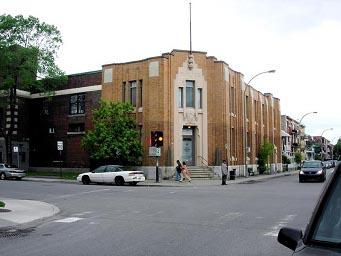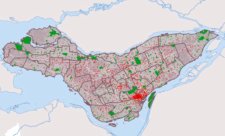|
Montreal DistrictsParc-ExtensionParc-Extension is located in the west part of the Villeray-Saint-Michel-Parc-Extension borough. It is a narrow district (PDF) surrounded by roads and railways. It is also the most densely populated district of the City of Montreal. In its centre, the old Jean-Talon train station has become the entrance to the Parc Metro Station. The train station was located at the end of the Park Avenue. People saw it as an extension of the Avenue du Parc and called it Parc-Extension. During the recent years, the rehabilitation of the Jean-Talon train station, the refitting of several parks, the revitalization of St-Roch Street, the conversion of the William Hingston (PDF) High School into a Sporting, Cultural and Community Centre and the installation of a library and of a public swimming pool, are important steps towards the revitalization of the district. In 1910, the sector was mostly agricultural and French, but later, as soon as the territory became urbanized, it turned into a sector mostly inhabited by British people. Because of the massive arrival of Greek immigrants in the 1960's and the 1970's, the area became the "Greek district of Montreal". Nowadays, the Greek community living on the territory is still rather large. Then, the arrival of new waves of European immigrants, combined to the construction of the Jean-Talon train station now represent the most important development factors of the vicinity. True to its vocation, the district continued to accommodate immigrant populations. Nowadays, approximately one hundred different ethnic groups with more than forty different mother tongues now live in the neighbourhood. They mostly come from Greece of course, but also from India, Pakistan, Sri Lanka, Bangladesh and Haiti. The area has been accommodating immigrants for a very long time and the territory is now mostly associated with multiethnicity and multiculturalism.  Because of the “piqueries”, the street gangs and the violence that comes with it, the area was once called the “Bronx” of Montreal. It happened during the 1980s yet, the neighborhood is still called the Bronx. The phenomenon is in regression but the district and the borough still have a bad reputation and certain groups of people continue to feel insecure. The rates of victimization and delinquency of youngsters (18 years old and less) and the rates of crimes against property are lower than the average in the City of Montreal. The criminality rate is low, but the criminality is present. Plus, certain sanitary practices of the newcomers who know little about our customs and habits “irritate” the residents. Thank you for visiting Parc-Extension. Saint-Michel Exit Parc-Extension
|
Montreal Districts
What district am I in?
Ahuntsic
Anjou
Cartierville
Côte-des-Neiges
Hochelaga-Maisonneuve
Île Bizard
Lachine
LaSalle
Mercier
Montréal-Nord
Notre-Dame-de-Grâce
Outremont
Parc-Extension
Petite-Patrie
Pierrefonds
Plateau-Mont-Royal
Pointe-aux-Trembles
Rivière-des-Prairies
Rosemont
Roxboro
Sainte-Geneviève
Saint-Laurent
Saint-Léonard
Saint-Michel
Sud-Ouest
Verdun
Ville-Marie
Villeray
Atlas de l'emploi
Images Montréal
Images Montreal is a huge project that aims to be the biggest exclusive website of Montreal's skyscrapers, historical buildings and architecture landmarks.
Old historical monuments have a lot of interest as much as new apartment buildings, new skyscrapers or graffitis.
Montreal by Metro
Montreal by Metro is an unofficial website for fans of Montreal's metro system.
Our modern rapid transit system is one of the most architecturally distinctive subway systems in the world.
Unlike many other subway networks, every station in Montreal is distinct.
The system is beautifully decorated with hundreds of pieces of public art, including sculptures, frescoes, and stained glass.
STM Montréal
STM Montreal is composed of 68 metro stations spread along four lines and of a network made of 170 daytime and 20 night time bus service routes.
The metro provides 1.3 million trips every day. STM Montreal web site also offers a section called Art in the Métro.






